Mercedes EQA vs Renault Clio – Differences & prices compared
Compare performance, boot space, consumption and price in one view.
Find out now: which car is the better choice for you – Mercedes EQA or Renault Clio?
The Mercedes EQA (SUV) comes with a Electric engine and Automatic transmission. In comparison, the Renault Clio (Hatchback) features a Full Hybrid, Petrol or LPG engine with Automatic or Manuel transmission.
When it comes to boot capacity, the Mercedes EQA offers 340 L, while the Renault Clio provides 391 L – depending on how much space you need. If you’re looking for more power, decide whether the 292 HP of the Mercedes EQA or the 143 HP of the Renault Clio suits your needs better.
In terms of consumption, the values are 14.40 kWh per 100 km for the Mercedes EQA, and 4.30 L for the Renault Clio.
Price-wise, the Mercedes EQA starts at 44200 £, while the Renault Clio is available from 16600 £. Compare all the details and find out which model fits your lifestyle best!
Mercedes EQA
The Mercedes-Benz EQA presents a refined blend of elegance and electric performance, perfectly suited for urban environments. Its sleek and modern design emphasises aerodynamic efficiency while providing a sumptuous interior that epitomises luxury and comfort. With advanced technology seamlessly integrated into its user-friendly interface, the EQA ensures a connected and enjoyable driving experience.
details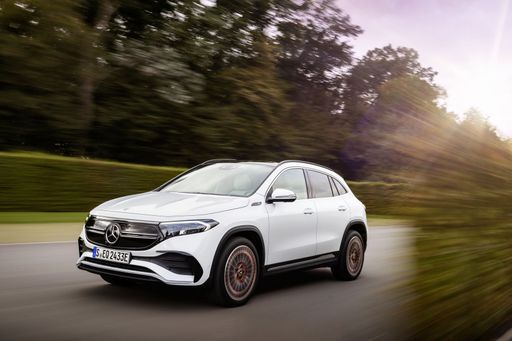 @ group-media.mercedes-benz.com
@ group-media.mercedes-benz.com
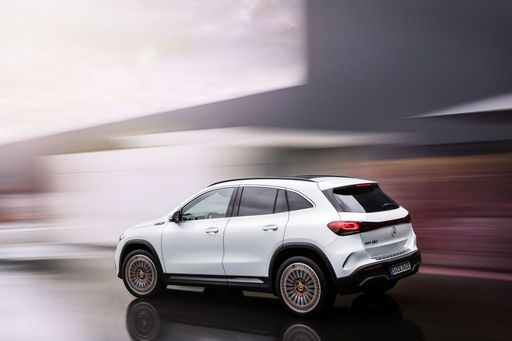 @ group-media.mercedes-benz.com
@ group-media.mercedes-benz.com
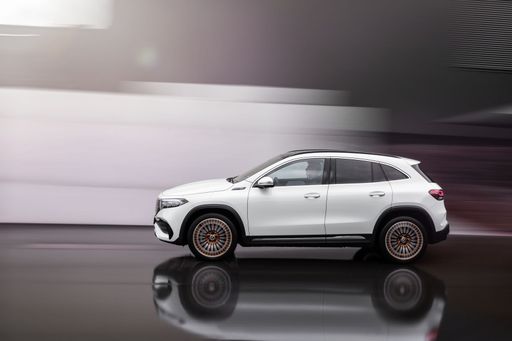 @ group-media.mercedes-benz.com
@ group-media.mercedes-benz.com
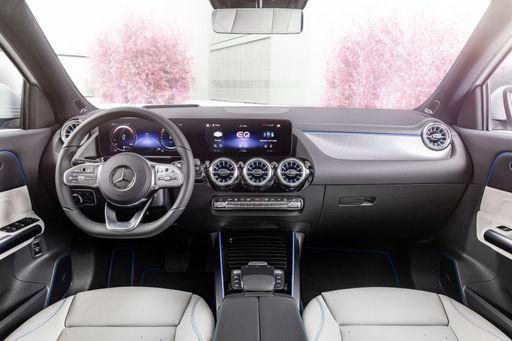 @ group-media.mercedes-benz.com
@ group-media.mercedes-benz.com
Renault Clio
The Renault Clio continues to impress with its sleek design and agile handling, making it a standout choice in the compact car segment. Inside, it offers a surprisingly spacious and comfortable cabin, crafted with high-quality materials that enhance the driving experience. Its fuel efficiency and reliable performance make it an attractive option for both city commuting and longer journeys.
details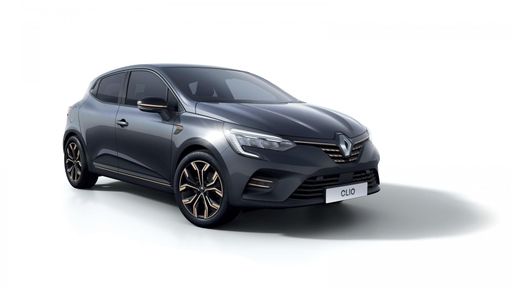 @ renault-presse.de
@ renault-presse.de
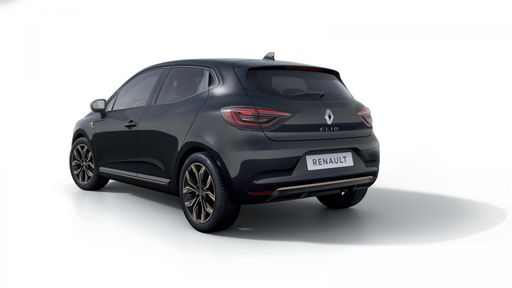 @ renault-presse.de
@ renault-presse.de
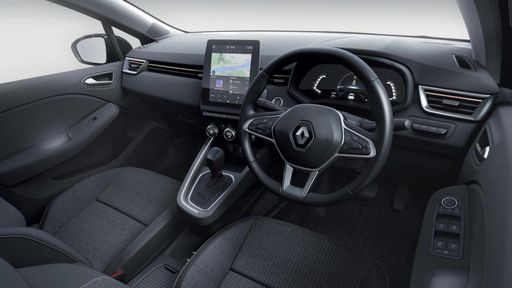 @ renault-presse.de
@ renault-presse.de

|

|
|
|
|
Costs and Consumption |
|
|---|---|
|
Price
44200 - 57400 £
|
Price
16600 - 23000 £
|
|
Consumption L/100km
-
|
Consumption L/100km
4.3 - 7 L
|
|
Consumption kWh/100km
14.4 - 16.9 kWh
|
Consumption kWh/100km
-
|
|
Electric Range
476 - 561 km
|
Electric Range
-
|
|
Battery Capacity
70.50 kWh
|
Battery Capacity
0.60 kWh
|
|
co2
0 g/km
|
co2
97 - 122 g/km
|
|
Fuel tank capacity
-
|
Fuel tank capacity
32 - 42 L
|
Dimensions and Body |
|
|---|---|
|
Body Type
SUV
|
Body Type
Hatchback
|
|
Seats
5
|
Seats
5
|
|
Doors
5
|
Doors
5
|
|
Curb weight
2045 - 2115 kg
|
Curb weight
1124 - 1331 kg
|
|
Trunk capacity
340 L
|
Trunk capacity
301 - 391 L
|
|
Length
4463 mm
|
Length
4053 mm
|
|
Width
1834 mm
|
Width
1798 mm
|
|
Height
1608 - 1613 mm
|
Height
1440 mm
|
|
Payload
425 kg
|
Payload
398 - 406 kg
|
Engine and Performance |
|
|---|---|
|
Engine Type
Electric
|
Engine Type
Full Hybrid, Petrol, LPG
|
|
Transmission
Automatic
|
Transmission
Automatic, Manuel
|
|
Transmission Detail
Reduction Gearbox
|
Transmission Detail
Automatic Gearbox, Manual Gearbox
|
|
Drive Type
Front-Wheel Drive, All-Wheel Drive
|
Drive Type
Front-Wheel Drive
|
|
Power HP
190 - 292 HP
|
Power HP
67 - 143 HP
|
|
Acceleration 0-100km/h
6 - 8.6 s
|
Acceleration 0-100km/h
9.3 - 17.1 s
|
|
Max Speed
160 km/h
|
Max Speed
160 - 174 km/h
|
|
Torque
385 - 520 Nm
|
Torque
95 - 205 Nm
|
|
Number of Cylinders
-
|
Number of Cylinders
3 - 4
|
|
Power kW
140 - 215 kW
|
Power kW
49 - 105 kW
|
|
Engine capacity
-
|
Engine capacity
999 - 1598 cm3
|
General |
|
|---|---|
|
Model Year
2024 - 2025
|
Model Year
2023 - 2025
|
|
CO2 Efficiency Class
A
|
CO2 Efficiency Class
C, D
|
|
Brand
Mercedes-Benz
|
Brand
Renault
|
Mercedes EQA
An Introduction to the Mercedes-Benz EQA: A Glimpse of the Future
The Mercedes-Benz EQA stands at the forefront of automotive innovation, representing a harmonious blend of luxury, performance, and sustainability. As part of the prestigious EQ range, this all-electric SUV embodies the essence of modern electromobility. In this article, we delve into the technical sophistication and innovative features of the EQA that make it a standout choice in the electric vehicle market.
Under the Bonnet: Powertrain and Performance
The Mercedes-Benz EQA offers a versatile range of specifications to cater to various preferences and requirements. From the agile front-wheel-drive models to the more robust all-wheel-drive versions, the EQA provides a wide spectrum of power outputs ranging between 190 PS and 292 PS. This impressive power comes alongside an efficient energy consumption of 14.4 to 16.9 kWh/100km, offering an electric range of up to 561 km, making it suitable for both city commutes and longer journeys.
Intelligent Design and Efficiency
Designed to achieve optimal aerodynamics, the EQA's exterior combines elegance with efficiency. Its streamlined dimensions feature a length of 4,463 mm, a width of 1,834 mm, and a height ranging from 1,608 to 1,613 mm. The adaptive use of materials ensures a competitive gross weight of 2,045 to 2,115 kg while maintaining a remarkable 0 g/km CO2 emission, indicative of its commitment to sustainable driving.
Interior Comfort and Technological Innovation
Inside, the EQA is designed to offer maximum comfort and state-of-the-art technology. It accommodates up to five passengers with ample room and a boot capacity of 340 litres. The advanced MBUX (Mercedes-Benz User Experience) system is at the heart of the cabin, enabling intuitive interaction through voice or touch controls, ensuring that every journey is as convenient as it is connected.
Safety and Driving Assistance
Safety is paramount in the EQA, with an array of driver assistance systems to enhance security on the road. From adaptive cruise control to active lane-keeping assist, the EQA's suite of safety features ensures a secure and confident driving experience. These systems are integrated seamlessly, offering peace of mind without compromising on the joy of driving electric.
Cost and Value Proposition
With starting prices ranging from €50,777 to €66,961, the EQA positions itself as a cost-effective luxury electric SUV. The investment is further justified by its minimal running costs, with monthly expenses between €1,179 and €1,496 and a cost per km between 47.2 and 59.9 cents. This competitive pricing is complemented by its maintenance savings, making it a prudent choice for those making the transition to electric mobility.
Conclusion: A New Era of Electric Luxury
The Mercedes-Benz EQA exemplifies a fusion of luxury, sustainability, and cutting-edge technology. Its impressive range, intelligent design, and advanced features embody the future of electric vehicles. Whether you seek efficiency, style, or state-of-the-art innovation, the Mercedes-Benz EQA offers all this and more, marking a significant milestone in the evolution of electric driving.
Renault Clio
Introduction to the Renault Clio
The Renault Clio, a popular choice among compact cars, has continually advanced its design and technology to maintain a strong position in the automotive market. With enhancements in engineering, efficiency, and aesthetic appeal, the Clio remains a top contender in the hatchback category.
Advanced Hybrid Technology
The Renault Clio's hybrid technology is one of its standout features. The E-Tech Hybrid system optimises both performance and efficiency, offering a seamless transition between electric and fuel-powered driving. This setup results in an impressive fuel consumption rate of 4.3 L/100km, making it an attractive option for eco-conscious drivers.
Efficient Engine Options
Renault offers a variety of engine choices for the Clio, accommodating different driving styles and preferences. From the economical SCe 65 manual variant to the powerful TCe 100 LPG gas version, each option is engineered to balance performance with fuel efficiency. With outputs ranging from 67 to 143 PS, drivers can enjoy a tailored driving experience.
Design and Comfort
The Renault Clio stands out with its sleek and modern design, characterized by its hatchback body style. The interior boasts an ergonomic layout with seating for five, ensuring passenger comfort and convenience. With a boot capacity of 301 to 391 litres, the Clio also offers practical storage solutions for everyday use.
Safety and Innovation
Safety is a key priority for Renault, and the Clio reflects this commitment with its suite of innovative safety features. Advanced driver-assistance systems are integrated throughout, enhancing both safety and usability. The Clio encompasses features like lane departure warning, automatic emergency braking, and adaptive cruise control.
Cost Efficiency and Environmental Impact
The Renault Clio not only offers affordability with pricing ranging from €18,450 to €26,800, but also promises low running costs. With CO2 emissions between 97 and 130 g/km, the Clio fits well within the C and D efficiency classes. This makes it a cost-effective and environmentally friendly choice for modern drivers.
Conclusion
Renault Clio remains a dynamic, dependable and economical option in the compact car segment. With its innovative technologies, diverse engine options, and commitment to safety and design, the Clio continues to impress and adapt to the evolving demands of the automotive world.
Which drive types are available for the Mercedes EQA?
Available as .
The prices and data displayed are estimates based on German list prices and may vary by country. This information is not legally binding.
